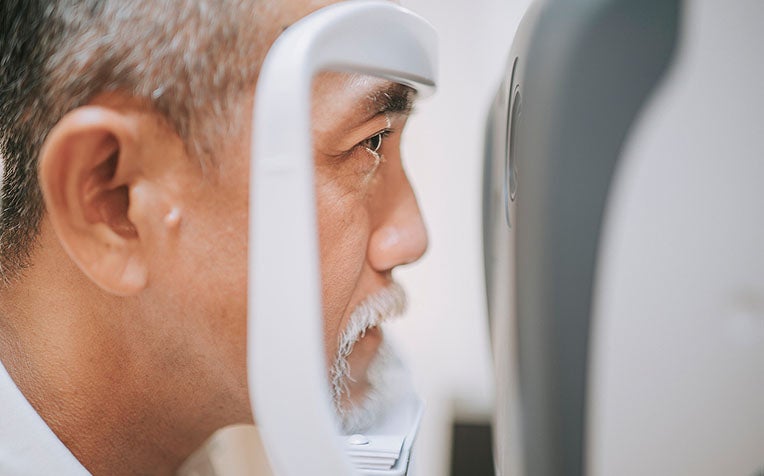
Glaucoma is best prevented by going for regular eye checks so as to be able to pick up eye problems early.
In Singapore, glaucoma accounts for 34 per cent of blindness and is the second major cause of blindness in Asia after cataracts.
Glaucoma is a disorder of the optic nerve and usually develops as a consequence of high pressure within the eye. Often termed the ‘Silent Thief of Sight’, glaucoma is hardly noticeable in its early stages as patients usually do not have any symptoms. It is only during the advanced stages, when the visual loss is profound, that patients notice a significant impact on their lives.
However, most blindness from glaucoma is preventable if the disease is detected early or well controlled.
“Glaucoma is detected through measurement of the intraocular pressure of the eye and a thorough assessment of the optic nerve at the back of the eye. The condition cannot be cured, but in most cases, it can be successfully controlled with a combination of either eyedrops, laser or surgery,” says
Dr Reuben Foo, Consultant from the Glaucoma Department at
Singapore National Eye Centre (SNEC), a member of the
SingHealth group.
Watch this video to learn how glaucoma is diagnosed and treated!
What to do to prevent glaucoma
Here is a self-help guide to aid you in detecting the condition in its early stages, which is crucial in preventing vision loss or slowing its progression.
1. Go for regular eye check-ups
Our eyes become more susceptible to damage and disease as we age. Thus, it is important to be alert to changes in vision and pick up eye problems early.
Regular comprehensive eye examinations are vital to prompt diagnosis and treatment of eye conditions such as glaucoma. If you:
Have a family history of glaucoma:
You should go for a comprehensive eye exam every year or two after the age of 35.Do not have a family history of glaucoma:
If you are under the age of 40, you should go for a comprehensive eye exam every three to four years.
If you are aged 40 and above, you should go for a comprehensive eye exam every one and a half to two years.
“Those with chronic conditions such as diabetes or high blood pressure (hypertension) or are using long-term corticosteroids are also at risk of certain types of glaucoma,” advises Dr Foo.
2. Eat well to see well
Be sure to include leafy green vegetables and coloured fruits, berries and vegetables in your daily diet as they contain vitamins and minerals that protect your body and eyes. In fact, studies show that eye-healthy foods like carrots, fish and citrus fruits are better than vitamins at preventing glaucoma.
3. Exercise regularly but safely
Regular, moderate exercise benefits your overall health and may help prevent glaucoma by reducing eye pressure. Consult your doctor if you have concerns about starting an exercise program.
4. Wear eye protection
Serious eye injuries can elevate the eye pressure and lead to traumatic glaucoma or secondary glaucoma. Take precaution by wearing protective eyewear especially when engaging in high-risk sports or occupations.
What to do to manage glaucoma better
1. Apply prescribed eye drops regularly
Glaucoma eye drops reduce eye pressure and prevent damage to your optic nerve. It will not cure the condition or reverse vision loss, but it can help to prevent the disease from progressing. So, be sure to maintain a schedule to take the proper dosage as prescribed by your Ophthalmologist. If you have any problems with your medications and dosages, inform your doctor.
2. Eat a healthy diet
Eating a healthy diet can help you maintain your health, but it won't prevent glaucoma from worsening. Vitamins and nutrients important to eye health include zinc, copper, selenium, and antioxidant vitamins C, E, and A. You may also want to limit your caffeine intake as large amounts of caffeine can increase eye pressure.
3. Continue to maintain a healthy lifestyle
Exercising several times per week can be beneficial but do consult your doctor about your exercise routine. You may want to avoid exercises which involve straining and lifting of heavy weights, or those that put your head in a position below your heart for prolonged periods, as this can increase eye pressure, which worsens glaucoma.
4. Work closely with your care team
Stay in contact with your glaucoma care team with regular check-ups and keep them up to date on the status of your condition. They are in the best position to help manage your treatment plan when needed or involve other eye care teams for rehabilitation.
5. Make your home safer for low vision
Depending on the severity of your vision loss from glaucoma, it may be helpful to make your home safer by:
Installing extra lighting to increase visibility in dark areas.
Removing trip hazards such as rugs and furniture that restrict movement.
Using blinds and curtains to control glare.
To learn about the specialised services and support provided by the SNEC glaucoma team to help patients preserve their vision, click here.
Ref: H24
Check out other articles on glaucoma:
Glaucoma: Risk Factors, Symptoms and Treatment
To learn more about your eyes, click here.
Contributed by


















 Get it on Google Play
Get it on Google Play